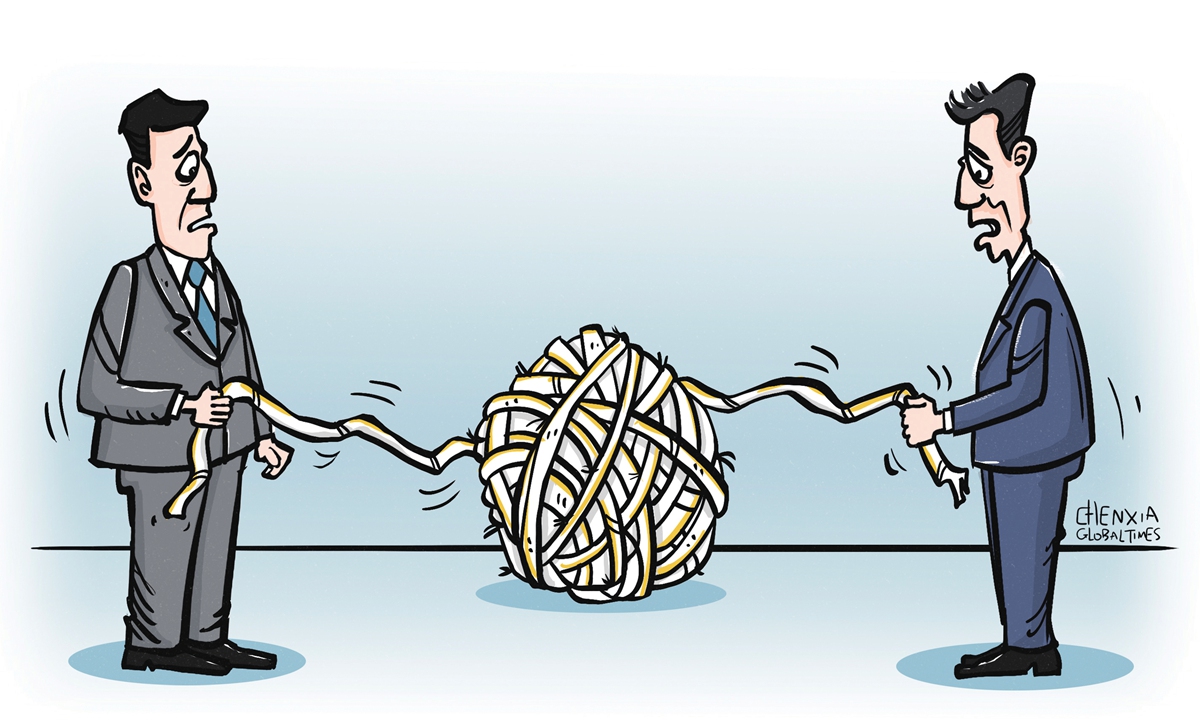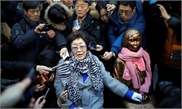
Illustration: Chen Xia/GT
South Korean President Yoon Suk-yeol will travel to Japan on Thursday for talks with Japanese Prime Minister Fumio Kishida. According to Japanese and South Korean media, they will exchange views on history, economy, diplomacy, trilateral cooperation between the US, Japan, and South Korea and other issues, in an attempt to beef up bilateral relations. Yoon's visit to Japan signifies a diplomatic recovery between the two countries after years of difficulties. On Wednesday, a presidential official of South Korea told reporters that there will be no joint statement on the summit. Apparently, a long way is ahead before a new chapter in Japan-Korea relations.Despite being close geographically, ties and exchanges between leaders of Japan and South Korea have been very limited in recent years. The flying time between Tokyo and Seoul is about 2.5 hours, yet the "shuttle diplomacy" between the leaders has taken 12 years. This reflects the fact that the relationship between the two countries is at low ebb and shows their insufficient efforts and lack of sincerity to bolster bilateral ties.
The main drive for the meeting is that the Yoon administration proposed a plan to pay the "forced laborers from World War II" by a local foundation rather than Japanese firms on March 6, which was welcomed by the Japanese government and the US, but was considered to have hurt South Korea's own interests.
Both the Japanese and South Korean governments hope to take this opportunity to improve bilateral relations. However, this summit is not just about "overcoming unfortunate history, developing future-oriented relations based on reconciliation as well as good-neighborly and friendly cooperation." Instead, both sides have their own calculations.
From Kishida's perspective, the summit and a resolution of the "forced laborers during World War II" issue will highlight his diplomatic skills. If the issue that the Abe and Suga administrations were unable to resolve was addressed by the Kishida government, this will stand as proof of his diplomatic abilities to the Liberal Democratic Party and Japanese society. At the same time, the Kishida administration is following Europe and the US on the Ukraine issue and escalating tensions in Japan-Russia relations. Its description of China as "the greatest strategic challenge" has also cast a shadow over China-Japan relations. Coupled with the country's long-standing negative policy toward North Korea, Japan is likely to be isolated in Northeast Asia.
Therefore, Kishida's positive attitude toward South Korea certainly takes geopolitical factors into consideration, which is also a signal to the US that Japan would like to support its "mini-NATO" plan in Northeast Asia.
From the standpoint of Yoon, a talk with the Japanese prime minister and improving bilateral relations demonstrate that he is not a "political novice." Without political experience before, Yoon's political capabilities have been questioned since he was elected as president. Thus, President Yoon regards it as a chance to show his statesmanship by resolving historical issues and improving relations with Japan.
Nevertheless, no matter how close the two leaders may appear, the fundamental contradictions between the two countries can't be eliminated, and this will continue to be an obstacle in future Japan-Korea relations.
For one thing, there is still a source of tension between Japan and South Korea over the issue of "forced laborers during World War II." From Japan's view, while it welcomes the plan proposed by the Yoon administration, there is also a concern that if the next president is elected from the Progressive Party in South Korea, the decision reached by the current administration will likely be overturned.
For another, President Yoon's proposal is facing a huge backlash from public opinion and the National Assembly of South Korea.
Finally, historical issues are not simply about compensation. For the Korean laborers who were forced into slavery and their families, such painful memories of suffering would never disappear.
In fact, what they need is a sincere apology and reflection from Japan rather than merely financial compensation. Given that Japan has never made an apology to the victims or truly reflected on its actions, the historical issues between Japan and South Korea will definitely continue to exist and remain impossible to be resolved from the roots.
The author is a visiting researcher at the Institute of Japan Studies, Liaoning University. opinion@globaltimes.com.cn


